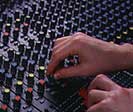| Author
|
Bass energy
|
Freeflow
IsraTrance Full Member

Started Topics :
60
Posts :
3709
Posted : Jul 18, 2006 03:22
|
Hey people!
i got a little question....
How come one speaker system can make a track sound good, but in another system it sounds "too much"
how can i get around this problem...
i got a Blue sky mediadesk, here you can see the specs of it
http://www.abluesky.com/p_s_gb/p3s7.html
i dont know if its acoustics that trick me or if its the system that dont overload where others would...
i like the blue sky system but its a pain in the ass to not get a mix that translates good to other systems.... probably i havent tried hard enough and yeah ignorance is a bliss... but i dont want it that way..
i hear tracks that sounds so full and fat without overloading, and they sound good on various systems... but my "tracks" sometimes overload or sound too wimpy or both at the same time,i mean what could be my problem?
should i get my self a pair of nearfields without a subwoofer, a pair that will tell me that its "too much"
if anyone got a good advice, or just a hint of what i should think of....
im thinking of selling my blue sky system... but before i do i would like to know why im selling it.. hehe
is it because i Eq wrong or mix certain elements wrong....or maybe i have missed out on some important calibration...?
im twisting and turning...
|

|
|
Freeflow
IsraTrance Full Member

Started Topics :
60
Posts :
3709
Posted : Jul 18, 2006 06:02
|
Im adding some stuff to this topic...
http://www.alexandermagazine.com/recordingeq/eq/req0104/bass.htm
real nice advice here...
and i think ill keep my blue sky and just add some good nearfields...
still all bass energy advice is welcome...
especially how to get a good stereo bass...
do you use chorus for that or any other trick?
|

|
|
Meta
Meta/Boomslang

Started Topics :
24
Posts :
1045
Posted : Jul 18, 2006 06:21
|
Quote:
|
i hear tracks that sounds so full and fat without overloading, and they sound good on various systems... but my "tracks" sometimes overload or sound too wimpy or both at the same time,i mean what could be my problem?
|
|
Do you mean your tracks overall, or JUST the bass is off?
Start by cutting everything below 30hz. Everything below this range is sub-bass only, and generally cannot be heard, only felt. This range takes up a lot of energy in your mix without giving much benefit.
Uh, generally, "stereo bass" isn't really a good idea. Anything that adds stereo effects is going to take away from the power and energy of your bass, stereo stuff usually sounds best on leads.
Most of this is probably in the Basslines sticky thread at the top.
        http://soundcloud.com/aeon604 http://soundcloud.com/aeon604
http://www.metaekstasis.com/
http://the1134.com/ |

|
|
Freeflow
IsraTrance Full Member

Started Topics :
60
Posts :
3709
Posted : Jul 18, 2006 07:00
|
Hey Aeon - not all my tracks.. but lately i have had problems with getting a full sound...
im thinking maybe i mix my kicks too loud.....
and sometimes i mix the bass too loud, but when i lower it in volume it loses too much prescence...
im sitting here comparing some tracks and i can hear that some has a good balance while others are way off in terms of balance between kick and bass.... the thing why i started this thread is that i started a track some days ago and it all sounded so sweet here at home, but when i took it over to my brother it was too loud in the bass, so it got me wondering how it could be such difference in speaker systems... maybe its acoustics thats playing tricks on me...
the stereo bass issue, what i mean is wide baselines, its almost sound like they have been seperated.... is this something that waves imager would provide? or is it a mastering issue?
|

|
|
sideFXed
IsraTrance Junior Member

Started Topics :
22
Posts :
430
Posted : Jul 18, 2006 08:53
|
the only thing I can imagine with stereo bass is a little bit of phasing. you want to have the bassline on both speakers all the time, or it will sound real bad on outdoor pa's 
for levels between kick and bassline, it helps to have rms measurement. a good spectrum analyzer or destroy fx rms buddy can help. After all you need to use your ears, so first that's no real workaround.
In some other forum I could also read that a little boombox or real cheap studio monitors like the yamaha ns 10 (if you still can get those) can help to decide what levels you mix. If you can consider a mix good on cheap systems, it probably will sound good on most systems.
I guess every brand of monitors is different, so also the guys with dynaudio and genelec need to know their speakers and their weaknesses.
        soundcloud.com/epsylohm soundcloud.com/epsylohm |

|
|
shamantrixx

Started Topics :
7
Posts :
549
Posted : Jul 18, 2006 14:06
|
Quote:
|
On 2006-07-18 06:21, Aeon wrote:
Uh, generally, "stereo bass" isn't really a good idea. Anything that adds stereo effects is going to take away from the power and energy of your bass, stereo stuff usually sounds best on leads.
|
|
This is quite wrong!
Generally "stereo" implicate two "mono" signals routed to separate speakers! Stereo bass line does not have to be phased or "time modulated" in order to feel like "stereo". You can preform various tricks to get stereo bass line with "mono power". Simplest of them all is that when you bounce a VST bass line to audio clip you bounce it twice. One with "default" release envelope settings of your patch and another with a bit longer / shorter release setting and route them 100% L and other 100% R. Even better is when you program or automate release settings in a "random" manner. As long as you don't tweeak attack the bass line will not loose any power but different / changing release will make it feel more stereo.
It's obvious that you can do countless tricks to make bass line stereo. Attack is a shortest part of the sound. You have plenty of decay, susstain and release to experiment with.
Further on stereo bass line with "time manipulation" CAN be more powerfull than any mono bass line. Remember... stereo tehnology is 2 times better than mono. There is no sound that requires mono tracking in order to feel right. But when it comes to drums and bass lines stereo production also requires twice as much work and attention in order to sound good. A bit of mathematisc is also required and makes it easier once you start to tweek tools in specific range of time that will sound good in a track that runs at speed of X cycles in a minute with X msec of "gap" between two bass notes played or kick and bass.
Layering is another way to make mono powered stereo bass line. One layer with mono bass attack layered with "attackless" chorused or phased bass and maybe another mono layer with heavy low treshold compression and gate to add more "body" that chorused bass could lack.
I hope you get the picture. Stereo can do anything that mono does and can even make it two times better  You just need a "bit" more time to make it right. Using "benefits" of mono in modern production is like using "advantages" of 2D graphics in a 3D movie. Not exactly the best way to go. You just need a "bit" more time to make it right. Using "benefits" of mono in modern production is like using "advantages" of 2D graphics in a 3D movie. Not exactly the best way to go.
        "It occurred to me by intuition, and music was the driving force behind that intuition. My discovery was the result of musical perception" "It occurred to me by intuition, and music was the driving force behind that intuition. My discovery was the result of musical perception"
Albert Einstein, speaking about his theory of relativity |

|
|
vipal
IsraTrance Full Member

Started Topics :
123
Posts :
1397
Posted : Jul 18, 2006 14:08
|
|
shachar
Basic

Started Topics :
13
Posts :
402
Posted : Jul 18, 2006 15:28
|
Quote:
|
On 2006-07-18 14:06, shamantrixx wrote:
I hope you get the picture. Stereo can do anything that mono does and can even make it two times better  You just need a "bit" more time to make it right. Using "benefits" of mono in modern production is like using "advantages" of 2D graphics in a 3D movie. Not exactly the best way to go. You just need a "bit" more time to make it right. Using "benefits" of mono in modern production is like using "advantages" of 2D graphics in a 3D movie. Not exactly the best way to go.
|
|
welll..
sometimes you dont need to work hard on the stereo to be "right" just use mono channels.
b.t.w sometimes even reducing bit rate can get a better result than using the higher rate.
|

|
|
Freeflow
IsraTrance Full Member

Started Topics :
60
Posts :
3709
Posted : Jul 18, 2006 15:40
|
hey guys thanks for your replys...
shamantrixx - nice info... will check it out
vipal - hey  yeah i got a SPL meter, though iv been lazy and i havent calibrated the system, even if i know i should have done it a long time a go, but iv been moving around latley so it hasnt been top priority.,.... yeah i got a SPL meter, though iv been lazy and i havent calibrated the system, even if i know i should have done it a long time a go, but iv been moving around latley so it hasnt been top priority.,....
but i think its worth a shot....
shachar - i never tried the bitrate reduction trick...
i will try it.... btw, do you mean i should divide my bass to two mono channels and pan them hard right and hard left?
|

|
|
vipal
IsraTrance Full Member

Started Topics :
123
Posts :
1397
Posted : Jul 19, 2006 01:58
|
hello, i have also this blue sky speakersystem. i did not want to pay 100 euro's for a spl-meter so i forgot about the callibration but sometimes it bugs my mind. so this is my big chance:
could you after you did the calibration with these blue sky monitors come back here and tell if its really needed? pls... |

|
|
Meta
Meta/Boomslang

Started Topics :
24
Posts :
1045
Posted : Jul 19, 2006 02:28
|
Quote:
|
On 2006-07-18 14:06, shamantrixx wrote:
An incredible amount of work
|
|
Uh, dude... "Time manipulation"? Cycles vs. milliseconds and offset release times? For a BASSLINE?
Don't get me wrong - If you say you've achieved cool results using these techniques, I believe you, but that sounds like seriously detailed, advanced knob-twisting action. This guy is asking for basic "How for do I get good bassline?" answers... stuff like that is going to intimidate people looking for basics of "how do I make it sound good on a big system".
Generally speaking, adding chorus or any kind of modulation effect robs your bassline of power. It sounds like you've nailed down a pretty precise method to avoid that and get better results, but... that's not exactly something you can just throw out there.
By all means though... write a kick ass tutorial, I'd like to hear more.        http://soundcloud.com/aeon604 http://soundcloud.com/aeon604
http://www.metaekstasis.com/
http://the1134.com/ |

|
|
piXan
IsraTrance Full Member

Started Topics :
107
Posts :
807
Posted : Jul 19, 2006 02:40
|
sooo.. the bassline should be mono??? if so what should i do.. render de midi to mono audio.. or route to a mono group track/channel???.
Should i aplly the eq, comp, ect before of after the rendering??? thats a bunch of doubts ive had for long time.. thanx for any reply..
jesus
        www.soundcloud.com/elektroakustica/sets/downtempo/ www.soundcloud.com/elektroakustica/sets/downtempo/ |

|
|
sideFXed
IsraTrance Junior Member

Started Topics :
22
Posts :
430
Posted : Jul 19, 2006 08:29
|
just use the dual stereo panner utility in the mixer of cubase (if that's your host) and set it to C/C. same as a mono group channel.
bassline is something I rarely bounce while producing. I do some test bounces with bassline and kick to see if they look okay as a waveform. But if you're happy with the results, why shouldn't you bounce if that's your way of working. Probably you want to reduce cpu usage, so I'd say bounce with eq, compression and so on. Keep the original midi and vst settings so you can recreate everything again.
I can see where shamantrixx is coming from  gotta try that myself. gotta try that myself.
        soundcloud.com/epsylohm soundcloud.com/epsylohm |

|
|
shachar
Basic

Started Topics :
13
Posts :
402
Posted : Jul 19, 2006 10:26
|
New Era Scientist - sorry youve misunderstood me...
bit reduction was an example and not meant to the bass topic.
about the bass - you can use one centerd mono channel or route one side of the stereo into mono group channel.
using dual panner into double centered its also an option but beacause of pan law its will be harder in gain too. |

|
|
shamantrixx

Started Topics :
7
Posts :
549
Posted : Jul 19, 2006 15:21
|
Quote:
|
On 2006-07-19 02:28, Aeon wrote:
Uh, dude... "Time manipulation"? Cycles vs. milliseconds and offset release times? For a BASSLINE?
Don't get me wrong - If you say you've achieved cool results using these techniques, I believe you, but that sounds like seriously detailed, advanced knob-twisting action. This guy is asking for basic "How for do I get good bassline?" answers... stuff like that is going to intimidate people looking for basics of "how do I make it sound good on a big system". |
|
Well sometimes there's no simple explanation and no simple way of doing things. As far as I know there are 2 kind of good bas lines. First one is based on trying a few hundread presets until one fits the kick drum. You make it mono, add a bit of EQ and compression and you're good to go.
If you don't like the idea that your production depends on good presets and chance that you'll recognize a good patch after you tried 167 patches... than you have to get deeper into the sound. Maybe others have found easyer methods but I don't see a middle way that can be done without cycles, msec, and some fine tuning of every little detail you work on.
Not so long ago I was also killing my self with tons of presets and tweeking the oscilators to my bones. It also can get you very good sound. But this way I make it even faster and I don't get into the sittuations when I have spend 3hrs tweeking the oscilators and than finaly realise that this patch is not getting any better. I hate that kind of situations as well as the idea that any part of my production is chance related.
Quote:
|
On 2006-07-19 02:28, Aeon wrote:
Generally speaking, adding chorus or any kind of modulation effect robs your bassline of power. It sounds like you've nailed down a pretty precise method to avoid that and get better results, but... that's not exactly something you can just throw out there.
By all means though... write a kick ass tutorial, I'd like to hear more.
|
|
Methods like this one are a bit tricky to write tutorials since they depend entirely on what you hear! If you can't distinguish what exactly your bass line is lacking than you simply can not add a layer with certain characteristic... for example a snapy attack layer with content only above 800 Hz. As long as you don't hear what's missing you'll just keep EQ-ing and compressing your bass line and hope that in one point it will start to sound good.
Bass lines in trance production are really a pain in the ass if you want to sound good. To be honest IMO most of nowdays projects DON'T have a good bass line sound. More or less it sounds good when all the parts of track play together with it (lead, pads, snares, hats, kick etc...) but when bass and kick are solo most of bass lines sound like shit eventhou they play only 2 or 3 tones of octave. Other tones have to be avoided 'cause they sound really lousy because of static EQ or filters. So I've pick out few good projects and producers and listen to their tracks over and over again comparing them with my bass lines and trying to distinguish what I'm missing. Once you start recognizing the differences there are countless ways to do the job.
What I'm suggesting is that a good producer should listen as much as he produces his owh music. The basic tool for making music is your hearing. The monitoring, hardware and software comes in second place. What is the purpose of a dynaudio or macke monitoring if you're not able to distinguish the difference between a excelent, good and lousy bass line in terms of frequencyes, harmonic content, ADSR shape and different layers of what sounds like single bass note!?
Production of music without this basic skill is like waiting for the sun to rise in a cave facing north. No chance! |

|
|